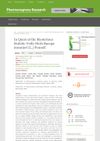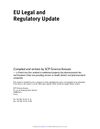January 2008 in “วารสารการแพทย์และวิทยาศาสตร์สุขภาพ (Journal of Medicine and Health Sciences)” Clitorea ternatea and Citrus hystrix extracts can promote hair growth at certain concentrations.
 7 citations,
July 2019 in “International Journal of Molecular Sciences”
7 citations,
July 2019 in “International Journal of Molecular Sciences” PGA-4HGF may help treat hair loss by activating hair growth pathways and extending the hair growth phase.
 January 2012 in “Elsevier eBooks”
January 2012 in “Elsevier eBooks” New treatments for skin and hair repair show promise, but further improvements are needed.
December 2023 in “Plants” Fissistigma oldhamii has compounds that help with pain, inflammation, and other health issues.
 7 citations,
January 2015 in “Evidence-based Complementary and Alternative Medicine”
7 citations,
January 2015 in “Evidence-based Complementary and Alternative Medicine” The review suggests renaming two herbs to avoid confusion and recommends more research for safe use.
 1 citations,
January 2017 in “Social Science Research Network”
1 citations,
January 2017 in “Social Science Research Network” The document suggests creating a secure database for indigenous knowledge and recommends that the TKDL actively fight patents that slightly alter traditional knowledge.
 1 citations,
December 2023 in “Curēus”
1 citations,
December 2023 in “Curēus” Tadalafil is effective for treating urinary symptoms in men with BPH.
 1 citations,
June 2023 in “Pharmacognosy Research”
1 citations,
June 2023 in “Pharmacognosy Research” Bacopa monnieri, or Brahmi, is a traditional herb that may improve memory and treat various conditions, but more research is needed.

Ayurvedic herbs may reduce side effects and improve effectiveness of cancer treatments.
 5 citations,
October 2021 in “Journal of Ovarian Research”
5 citations,
October 2021 in “Journal of Ovarian Research” Cinnamon can help manage symptoms of polycystic ovary syndrome, improve menstrual cycles and fertility, and positively affect cholesterol and blood sugar levels, but more research is needed to confirm these effects and find the best dosage.
 2 citations,
May 2001 in “Current problems in dermatology”
2 citations,
May 2001 in “Current problems in dermatology” The conclusion is that effectively treating hair disorders is difficult due to the complex factors affecting hair growth and more research is needed to improve treatments.
 November 2007 in “Journal of Generic Medicines”
November 2007 in “Journal of Generic Medicines” Europe strengthened medicine regulations, increased protection against counterfeit drugs, and made it tougher to challenge comparative advertising, while also focusing on patent law enforcement and updating plant protection rules.
 June 2023 in “JAAD international”
June 2023 in “JAAD international” Patients with skin of color are more likely to use supplements for hair loss than Caucasian patients, but the effectiveness of these supplements is uncertain and they can be expensive.
January 2014 in “Indian dermatology online journal” Different treatments help heal leg ulcers depending on their type, with new therapies showing promise for chronic wounds.
 25 citations,
May 2009 in “International Journal of Dermatology”
25 citations,
May 2009 in “International Journal of Dermatology” About one-third of dermatology patients in Ankara, Turkey use unconventional treatments for skin issues.
 March 2023 in “International Journal of Advanced Research in Science, Communication and Technology”
March 2023 in “International Journal of Advanced Research in Science, Communication and Technology” Various medicinal plants like Polygonum multiflorum, Red ginseng extract, and Zizyphus jujuba can potentially treat hair loss, offering benefits like low cost and multiple ways of working. Other effective natural substances include Pygeum africanum, Seneroa, Urtica dioica, and more.
 32 citations,
January 2021 in “Molecules”
32 citations,
January 2021 in “Molecules” Some Middle Eastern plants may help treat diabetes and could be alternatives to current drugs, but more research is needed.

There are many ways to treat Polycystic Ovary Syndrome, including lifestyle changes, surgery, and various medications, but more research is needed for better treatments.
8 citations,
January 2019 in “Nanomedicine” Egyptian researchers are advancing in pharmaceutical nanotechnology, potentially improving health outcomes and the economy.
 24 citations,
July 2019 in “Cochrane library”
24 citations,
July 2019 in “Cochrane library” Some treatments like methotrexate with prednisone might help juvenile morphea, but more research is needed to confirm.
 July 2023 in “Biodiversitas”
July 2023 in “Biodiversitas” Sundanese mothers in a rural village in West Java use plants for maternal care.
 January 2020 in “Elsevier eBooks”
January 2020 in “Elsevier eBooks” Plant-based chemicals may help hair growth and prevent hair loss but need more research to compete with current treatments.
 7 citations,
January 2018 in “Skin appendage disorders”
7 citations,
January 2018 in “Skin appendage disorders” The document suggests recognizing "trichiatrists" as doctors specializing in hair and scalp health, using evidence-based treatments.
 January 2023 in “Brazilian Journals Editora eBooks”
January 2023 in “Brazilian Journals Editora eBooks” Pharmacists play a key role in managing the use of anxiety medications and ensuring patients use them correctly.
 April 2005 in “Dermatologic Clinics”
April 2005 in “Dermatologic Clinics” The document summarizes recent dermatological treatments and advances in areas like pediatric care, wound healing, skin closure, light-based therapies, pigment disorders, hair loss, immunotherapy, infection management, melanoma, drug reactions, and facial rejuvenation.
March 2021 in “Annals of palliative medicine” Plum-blossom needling with conventional treatments improves hair regrowth in alopecia areata.
 9 citations,
November 2018 in “Drug Discovery Today”
9 citations,
November 2018 in “Drug Discovery Today” Using skin stem cells and certain molecules might lead to scar-free skin healing.
 5 citations,
October 2022 in “Heliyon”
5 citations,
October 2022 in “Heliyon” Polycystic ovary syndrome, a disorder causing menstrual issues and infertility, can be treated with lifestyle changes, medication, herbal remedies, surgery, and assisted reproductive techniques like artificial insemination and IVF.
 9 citations,
December 2022 in “Phytomedicine”
9 citations,
December 2022 in “Phytomedicine” More high-quality research is needed to recommend flavonoids and saponins for clinical use.
 72 citations,
July 2014 in “American journal of clinical dermatology”
72 citations,
July 2014 in “American journal of clinical dermatology” Some treatments, like corticosteroids and sensitizing agents, can help with alopecia areata, but more high-quality research is needed.
























